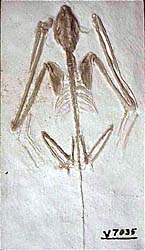What do
Bat (Chiroptera) Evolution and Intelligent Design have to do with each other? Nothing.
As revealed very early on in Wandel's wonderful ID thread, Intelligent Design is nothing but a bunch of pseudoscientific nonesense which is being used by creationists in a desperate attempt to hide their religious ideas behind a veil of scientific sounding terminology so they can sneak their religion into science classes.
But I mentioned Bat evolution in the ID thread and got accused of taking the thread off topic (god forbid that should ever happen), so I decided (purely out of respect for Wandel) to create another thread, in which we can talk about anything we like with regard to Bats, Evolution, and the insipid ridiculousness of ID if necessary.
The information on Bat evolution is sparse because so few fossils of bats have been found, but we can expect that bats went through an interesting transitional period just like whales did.

"Oldest Fossil Bat : The fossil at left comes from Icaronycteris index, a bat found in sediments of the Green River Formation. This is the oldest fossil known for a bat, and is beautifully preserved. The preservation includes the full skeleton, plus cartilage and wing membranes. The fossil suggests that bats had fully evolved flight by the Eocene."
Since there's no fossil evidence yet to answer much of this, I don't suppose there are many solid answers, but it makes me wonder just what the original Bat ancestors looked like, and just how evolved they were when the dinosaurs died out.
The only animals today that glide using toe webbing are frogs like Wallaces Flying Frog.

[/quote]
But there must have been a time when the trees and caves were filled with small furry mouselike things jumping around with webbed feet gliding between trees. It must have been an amazing little animal.